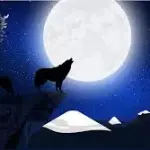 (Article is by guest writer Stefani Ruper. See short bio below).
(Article is by guest writer Stefani Ruper. See short bio below).
The idea of “big questions” is a popular cultural trope. Pretty much everybody knows what the big questions are. Who are we? Why are we here? Where do we come from, and where are we going? How should we live our lives? These are our biggest questions because they are the ones with the most elusive answers.
It’s fairly common to assume that these questions are perennial. That they’ve been around forever. But this presumption doesn’t really pan out in reality. In reality, the Big Questions are fairly new, at least when compared to tens of thousands of years of human history. This is not to say that people haven’t always wondered about why things are the way they are. They almost certainly did. But they also almost certainly did not share with us the intensity of ambiguity and uncertainty we must bear when we confront these questions. Those things are a result of thousands of years of intense philosophical and scientific development in a globalizing and technologizing world.
The impacts of cultural and technological development on our experience of the big questions cannot be overstated. Whereas humans once lived in reasonably isolated hunter-gatherer groups and had a single belief system to which everyone in the group assented, we now live in a hyper connected world in which there are dozens of thousands of ways of making sense of things. Our own view is no longer obvious, but instead constantly challenged.
The impacts of philosophy and science on our experience of the big questions likewise cannot be overstated. Whereas humans once turned to shamans and other gurus to help them retain information and stories from the past, we now have massive multi-million dollar academic institutions that are designed specifically to deconstruct the ideas we’ve inherited. We live in a world that encourages questions, and breaking things apart.
This means that our big questions are not just big questions but are actually Really Big Emotionally and Intellectually Intense Questions, once you understand that the depth of our uncertainty is so massively distorted from what we appear to have been built for. We don’t just question but we question, and with unparalleled intensity.
The problem for us is that even if we do not intentionally question existence—and the vast majority of people do not—we still live in a world in which default position has become nothing. If you believe in “something,” you have to do so with an awareness that other people don’t believe in this thing. In fact, many very powerful and smart people believe in things you find abhorrent.
When you take a position of belief—even a naturalistic belief—there is always, invariably, ambiguity. Other people believe different things, and your view is constantly being barraged by these different things. Sometimes you lose or change your belief, or experience doubt. Maybe sometimes you doubt if anything is worth loving or doing or feeling meaningful at all. Ambiguity is a part of what it means to live in the modern world.
So what’s to be done about this ambiguity?
The only thing we can do: learn to live with it. Modernity isn’t going away. Being surrounded by different beliefs isn’t going to go away. The intensity of our questioning isn’t going to go away.
People who have strong beliefs need to lessen their attachment to and defensiveness of their own personal truth. It’s unwise to be bull-headed when there is so much out there in the world from which to learn.
On the other side of the coin, people who abstain from forming strong beliefs need to learn to live with doubt. Most of all what they—and all of us, really—could benefit from is a re-framing. Rather than view the Big Questions as a source of anxiety that needs to be resolved, we can view it as an opportunity to experience mystery. Uncertainty and mystery are in a sense very similar phenomenon, but one is shot through with anxiety and the other with wonder and awe.
We might not have all the answers, but perhaps this is a liberating and wonderful thing. Perhaps we don’t need them. Perhaps we are better off without them. The human imagination is so limited, anyway, that whatever it is that is going on in the cosmos is probably more grand or at the very least more interesting than anything we’ve come up with so far. We honestly don’t know the reason we exist or what happens when we die, but that’s okay. Mystery can be wondrous and humbling.
We don’t need to cling to illusions of certainty and we don’t need to fret over uncertainty, either. We can instead cultivate excitement about living in this delightfully rich and unknown world that begs for our attention and care. It may not be easy to live with such intensely big questions, but thinking of them as mysteries to love instead of problems to solve is a beautiful place to start.
Learn about Membership in the Spiritual Naturalist Society
__________
The Spiritual Naturalist Society works to spread awareness of spiritual naturalism as a way of life, develop its thought and practice, and help bring together like-minded practitioners in fellowship.
Guest writer Stefani Ruper is a PhD candidate in Religion and Science at the University of Oxford. She is the host of The Meaning of Everything podcast, which explores insights into our biggest questions and problems in a naturalistic framework. She can be found on Instagram, on Facebook, or at her website.












